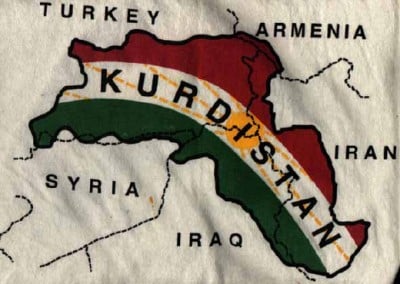Deconstructing the Kurdistan Referendum: Who Wins, Who Loses and the Fate of a Region
Global Research News Hour episode 192

“We will not allow the creation of a second Israel in the north of Iraq.”
– Iraqi Vice President Nouri al-Maliki. [1]
LISTEN TO THE SHOW
Click to download the audio (MP3 format)
While the world reels from news of Catalonia’s secession vote from Spain over the weekend, major powers have been sounding off on a similar referendum just six days earlier.
The area in northeastern Iraq known as Iraqi Kurdistan, or the Kurdistan Region, voted 92.73 per cent in favour of independence from Iraq.
While Kurds in the affected area were jubilant, leaders in surrounding countries fulminated and in some cases uttered threats.
The government of the multi-ethnic city of Kirkuk called for a curfew on the night of the vote. The central government of Iraq imposed an international flight ban on cities in the Kurdistan Region. Iraqi Prime Minister Haidar Al-Abadi said he would not enter into negotiations with the Kurdistan Regional Government, claiming the referendum was ‘unconstitutional.’
The Turkish government has threatened to cut off the supply of oil coming into the country from the Kurdistan Region. The United Nations Security Council members discouraged the vote, saying it “could hinder efforts to counter so-called Islamic State (IS) and help displaced Iraqis return home.”
The United States has likewise refused to recognize the referendum outcome. In a Saturday September 30 statement, none other than US Secretary of State Rex Tillerson said, “The vote and the results lack legitimacy and we continue to support a united, federal, democratic and prosperous Iraq.”
Israel meanwhile is the only country expressing support of Kurdistan’s aspirations to statehood.
In the century since British officer Mark Sykes and French diplomat François Georges-Picot signed an agreement setting the boundaries of the Middle East, the Kurds have been frustrated in their desires to secure a homeland. Does the referendum, binding or not, put the Kurds one step closer to achieving that dream? Or will it bring more bloodshed, or even war?
This week’s Global Research News Hour examines the fall-out from the referendum vote with three guests.
Henry Heller is Professor of History at the University of Manitoba. He is also the author of several books including The Capitalist University: The Transformation of Higher Education in the United Stated: 1945-2016 and The Cold War and the New Imperialism: 1945-2005 (1986). In the first half hour, Professor Hellyer puts the referendum in an historical context, explaining the origin of the Kurds, their grievances with its neighbours, and the comparison with stateless Jews in the period before 1948.
Nametuwllah Emre is Vice president of the Kurdish Association of Manitoba. He is also a Canadian citizen of Kurdish extraction living in the city of Winnipeg. Mr. Emre presents ‘the view from the diaspora.’ He does not seem to take the threats by Iraq and Turkey very seriously, and feels that his countrymen abroad are deserving of their own state.
Joe Lauria is a veteran foreign-affairs journalist. He has written for the Boston Globe, the Sunday Times of London and the Wall Street Journal among other newspapers. He has spent a lot of time in Erbil and was there for the referendum vote. He wrote an article on the eve of the vote published at Consortium news called Vote by Iraqi Kurds Adds to Tensions. He explores his understanding based on the fact he was present during the referendum vote in Erbil. He joins us from Cairo.
LISTEN TO THE SHOW
Click to download the audio (MP3 format)
The Global Research News Hour airs every Friday at 1pm CT on CKUW 95.9FM in Winnipeg. The programme is also podcast at globalresearch.ca . The show can be heard on the Progressive Radio Network at prn.fm. Listen in everyThursday at 6pm ET.
Community Radio Stations carrying the Global Research News Hour:
CHLY 101.7fm in Nanaimo, B.C – Thursdays at 1pm PT
Boston College Radio WZBC 90.3FM NEWTONS during the Truth and Justice Radio Programming slot -Sundays at 7am ET.
Port Perry Radio in Port Perry, Ontario –1 Thursdays at 1pm ET
Burnaby Radio Station CJSF out of Simon Fraser University. 90.1FM to most of Greater Vancouver, from Langley to Point Grey and from the North Shore to the US Border.
It is also available on 93.9 FM cable in the communities of SFU, Burnaby, New Westminister, Coquitlam, Port Coquitlam, Port Moody, Surrey and Delta, in British Columbia, Canada. – Tune in at its new time – Wednesdays at 4pm PT.
Radio station CFUV 101.9FM based at the University of Victoria airs the Global Research News Hour every Sunday from 7 to 8am PT.
CORTES COMMUNITY RADIO CKTZ 89.5 out of Manson’s Landing, B.C airs the show Tuesday mornings at 10am Pacific time.
Cowichan Valley Community Radio CICV 98.7 FM serving the Cowichan Lake area of Vancouver Island, BC airs the program Thursdays at 6am pacific time.
Campus and community radio CFMH 107.3fm in Saint John, N.B. airs the Global Research News Hour Fridays at 10am.
Caper Radio CJBU 107.3FM in Sydney, Cape Breton, Nova Scotia airs the Global Research News Hour starting Wednesday Morning from 8:00 to 9:00am. Find more details at www.caperradio.ca
Notes:
- https://www.telesurtv.net/english/news/Baghdad-Rejects-Second-Israel-US-and-Australia-Rejects-Kurd-Referendum-20170918-0018.html

